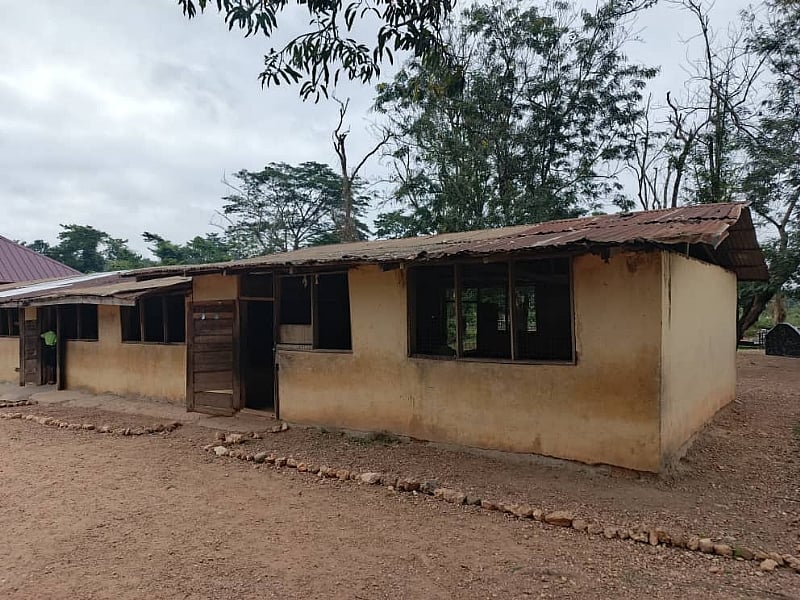The tranquil community of Ntinanko, nestled within the Bekwai Municipality of Ghana’s Ashanti Region, has been shaken by a storm of controversy surrounding allegations of financial impropriety against their elected Assembly member, Hon. Adu-Gyamfi. The heart of the matter lies in the alleged misappropriation of a donation of lumber intended for the much-needed refurbishment of the community’s dilapidated school. Residents claim that instead of utilizing the wood, generously provided by the Poano cocoa station, to repair the school’s leaking roof and improve the overall learning environment, Hon. Adu-Gyamfi diverted the materials for his personal gain. This alleged act of self-serving behavior has ignited a firestorm of indignation within the community, leaving residents feeling betrayed and demanding answers. The situation is further exacerbated by claims that Hon. Adu-Gyamfi openly admitted to using the donated wood to settle a personal debt, an admission that has only deepened the community’s mistrust and outrage.
The accusations against Hon. Adu-Gyamfi extend beyond the misappropriation of the donated lumber. Residents also express deep concern about the Assembly member’s lack of transparency and accountability regarding the management of community funds allocated for various developmental projects. They allege a pattern of obfuscation and a refusal to provide clear and comprehensive accounts of how community resources have been utilized. This perceived lack of financial transparency has fueled suspicion and eroded the community’s faith in their elected representative. The dilapidated state of the school buildings, with their leaking roofs and crumbling walls, stands as a stark reminder of the community’s unmet needs and the alleged mismanagement of resources intended to address those needs. The residents of Ntinanko are deeply worried about the safety and well-being of their children, who are forced to learn in these hazardous conditions, and they demand immediate action to rectify the situation.
The residents of Ntinanko paint a picture of a community grappling with a profound sense of betrayal and frustration. They feel let down by their elected representative, who they believe has prioritized personal gain over the welfare of the community, particularly its children. The alleged misuse of the donated wood is not merely a matter of misplaced materials; it represents a broken trust and a disregard for the community’s collective aspirations for a better future for their children. The residents’ appeal for a safe and conducive learning environment for their children underscores the fundamental right to quality education and the crucial role it plays in individual and community development. Their voices echo a deep-seated desire for a brighter future for their children, a future that they fear is being jeopardized by the alleged actions of their elected representative.
In response to the mounting accusations, Hon. Adu-Gyamfi has offered a defense that has further inflamed tensions within the community. He asserts that he is not obligated to account for the donated wood, claiming that he personally initiated the request for the donation. This assertion, however, has been met with vehement opposition from the residents, who maintain that the request was made on behalf of the community and that the wood was explicitly intended for the benefit of the school. They argue that regardless of who penned the request, the wood was a donation to the community, not a personal gift to the Assembly member, and therefore, he is accountable for its proper utilization. This clash of perspectives highlights the fundamental disagreement at the heart of the controversy: the Assembly member’s perceived sense of entitlement versus the community’s expectation of accountability and transparency.
The residents of Ntinanko are calling upon higher authorities to intervene and investigate the allegations against Hon. Adu-Gyamfi. They seek a thorough and impartial inquiry into the handling of community funds and the alleged misappropriation of the donated wood. Their plea for intervention reflects a deep-seated desire for justice and accountability. They want to ensure that those entrusted with public resources are held responsible for their actions and that the community’s funds are used for their intended purpose – the betterment of the community and the well-being of its residents. The residents’ unwavering commitment to holding their elected representative accountable underscores their belief in the principles of good governance and their determination to protect the interests of their community.
The situation in Ntinanko underscores the importance of transparency and accountability in local governance. It serves as a stark reminder that elected officials are entrusted with the responsibility of serving the community and managing its resources prudently and ethically. The allegations against Hon. Adu-Gyamfi highlight the potential consequences of a lack of transparency and accountability, eroding trust, fueling suspicion, and ultimately hindering community development. The residents of Ntinanko’s demand for answers and their call for intervention represent a crucial step in holding their elected officials accountable and ensuring that the community’s resources are used for the benefit of all, particularly the children who represent the future of Ntinanko. The resolution of this controversy will undoubtedly shape the future relationship between the community and its elected representatives, setting a precedent for how future issues of governance and accountability are addressed.


